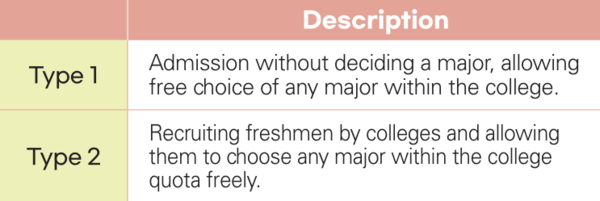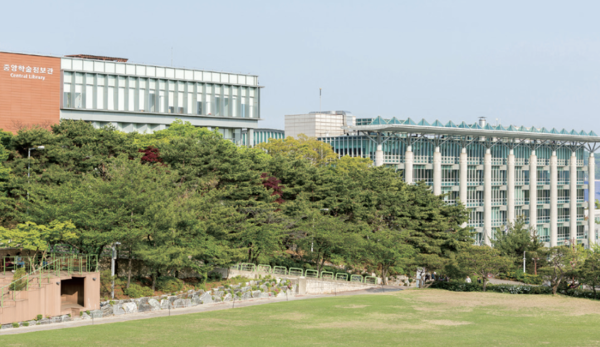Many high school students who have been forced to decide their majors have faced ramifications of discrepancy and hierarchy on campus. Consequently, a partial amendment to the Higher Education Act was decided on February 13th, freeing freshmen from stationary major selection. The Sungkyun Times (SKT) will examine several issues regarding the undeclared major system and forecast the future of college education.
Diving Deep into the Amendment
- A College without Majors?
The undeclared major system is an academic structure that allows college freshmen to experience various disciplines before choosing a major that best fits their aptitude in their sophomore year. The amendment removes Article 9, Paragraph 2 in the Enforcement Decree of the Higher Education Act, which states, “Colleges shall establish departments or faculties as a principle.” This change relaxed the department transfer restrictions by dismantling the boundaries between majors and autonomy. The system is categorized into two types based on the range of choices available.

The undeclared major system was created against the backdrop of South Korea’s education fever and intense competition, enabling anyone to choose their desired major after admission. Considering the nationwide tendency to choose colleges and departments based on grades, the rate of selecting jobs based on majors after graduating from college is significantly low, resulting in a gap between education and employment. Moreover, the government has continuously pointed out the segmentation of secondary education that fits specific majors, such as specialized high schools or science-intensive schools. Debates regarding this reform emerged as a reaction to this critical atmosphere.
- Freedom Speaks Volumes
Universities that incorporate the system of undeclared majors can experience several benefits by breaking down the boundaries between departments and fostering an integrated academic community. Firstly, college students can gain the opportunity to explore numerous careers after graduating high school. Since the academic burden posed upon high school students is too laborious for them to carry, students tend to focus more on the college entrance exam than career preferences. Thus, the freedom of choosing majors opens possibilities for students, planting the opportunity for academic quests to discover their talents and interests. Moreover, by dismantling the boundaries in line with the current demands for diverse capabilities, the system builds the foundation to nurture convergent talents with both humanities, sensibilities, and mathematical thinking. Last September, Sungkyunkwan University (SKKU) emphasized the need for anyone to be able to take courses in desired new technology fields beyond departmental boundaries at the launch ceremony of the Convergence Talent Training Project for medical artificial intelligence learning. According to a February report by Kyunghyang Shinmun, Minister of Education Lee Ju-ho mentioned that “breaking down the walls inside and outside the university for autonomy and creativity” is expected. Despite the active promotion by the Ministry of Education and major changes in university admissions guidelines, the negative aspects of undeclared majors are being highlighted.
The Flip Side of Freedom
- Popularity Game
The undeclared major system may lead to a division of college majors based on the versatile preferences of students, potentially overcrowding popular majors. For majors in high demand such as business and engineering, accommodating the influx of students due to lowered boundaries would be challenging. According to a February 1st report by Korea University News, more than half of the undeclared major students at Seoul National University flock to majors with favorable employment prospects, such as computer science and economics, every year. Kim Gayeon (Sophomore, Department of Economics) suggested, “I think many inconveniences, including the long waiting line for office hours, is due to an increase of double major students.” Furthermore, as the number of undeclared major admissions increases, students choosing liberal arts as their major may decrease. The study of humanities may fall behind in research fund projects compared to the science and technology division. If this situation persists, certain unpopular departments may even disappear entirely. If unpopular academic courses are not offered due to insufficient enrollment, students’ choices will be even more limited than before. As the gap between the majors’ input and output widens based on their popularity, departments will be divided into those with many student enrollments and those without a single applicant. This irony will potentially hinder the successful convergence the undeclared major system originally aimed to achieve.

- A Favorable Coercion
Colleges facing financial crises from the decrease of admissions and tuition freeze policies must expand the system of undeclared majors, albeit reluctantly, to receive monetary incentives from the government. Given the characteristics of Korean education, where high school education is closely linked to college admissions, attempts to control the education community economically without democratic reflection will cause great confusion for many students. Urging rapid changes without preparing for faculty expansion and the academic system by providing a uniform financial incentive is detrimental. Academic communities centered around universities, such as minority departments and schools that value deep academic exploration, will struggle with the implementation of the undeclared major system. Consequently, university presidents, professors, and labor unions are sharply opposing the amendment. At a press conference in the National Assembly on January 23rd, the National Professors’ Union criticized the undeclared major system, saying, “The core intention of the system is to restructure universities as the market desires.” Thus, the academic community of universities is ringing the alarm about the amendment, arguing that a policy started to ensure autonomy is instead taking it away.

Education Forecast
- Coexistence beyond Departments
Fixing the imbalance between departments caused by the system and strengthening its initial purposes can be accomplished by expanding the education infrastructure, both quantitatively and qualitatively, in response to the overpopulated majors. For example, overcrowding can be prevented by dividing computer-related majors into artificial intelligence and software departments. Additional specialized courses linked to professional careers must be offered to disperse the demand for popular majors, allowing students to inspect various career paths. Also, policy improvements to assist youth employment through institutional collaboration are required to improve the educational infrastructure. However, preliminary research and development must come first; hence, the enactment of the policy should be postponed. In addition, measures for unpopular majors are imperative. While the current amendment specifies separate regulations only for popular majors such as medicine, it is necessary to concretize the roadmap for departments that lack students. Introducing basic discipline and extensive humanities education, like the early Korean university education inspired by American undergraduate-centered colleges, can revitalize struggling departments by allowing students to tailor their own majors.
- Democratization of College Education
An academic way must precede the implementation of a uniform policy to ensure the main objective of the legislation. Firstly, rather than incentivizing financially struggling universities, the system should remain a mere recommendation. Details of the legislation should be determined through an opinion-collection process from each university to mitigate coercive aspects, creating a roadmap for nurturing convergent talents. With the budding tuition freeze and budget revision amendment, rushing the policy to secure the budget should be avoided until the university becomes financially stabilized. Including the academic community in the discussion can create refined guidelines for expanding students’ career choice opportunities. Professor Kim Seonghoon of the Department of Library and Information Science at SKKU said, “To nurture creativity and convergent talents through free major systems, students need time and space to discuss numerous fields, which university institutions should support.” To develop the core of university society, supporting autonomous regulations is essential.

Undeclared majors, which breaks away from the notion that one must stick to a major chosen once for life, is a remarkable educational breakthrough. However, there is no panacea in the realm of education, which must consider several conflicting interests. The undeclared major system should listen to the voices of students and schools, advance towards a creative academic community, and contemplate what is truly in the best interest of students.
